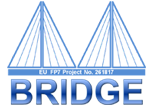Working Around Disruptions of Network Infrastructures - Design and Evaluation of Mobile Ad-hoc Systems for Resilient Communication in Disasters
Amro Al-Akkad (Fraunhofer FIT)
Abstract
The use of information and communication technology services can be constrained in disaster situations, when it is important for affected persons to receive and send up-to-date information on current incidents and their evolution. Previous studies have shown the importance of propagating disaster-relevant information over the World Wide Web. In such situations, users without Internet access find themselves in an "information vacuum" until the network inftrastructure is restored.
This thesis addresses the exploitation of cell phones in disaster situations which cause the disruption of network infrastructure. The first part of this thesis collects empirical material on how people creatively use remnants of technology to com-municate in disasters. The empirical data is drawn from primary and secondary sources: interviews with domain experts and people who have experienced a disas-ter situation, as well as external reports and scientific literature. Based on this empir-ical foundation, this work develops a conceptual framework that comprises a collec-tion of quality attributes. When exploiting cell phones to create ad-hoc systems in disaster situations, the implementation of such quality attributes can potentially support the resilience of mobile ad-hoc systems.
The second part of this thesis focuses on the iterative design and evaluation of two such mobile ad-hoc systems, showing how these quality attributes can be imple-mented. To explore the feasibility of the systems and their implications for the work practices in the emergency response domain, they are deployed under close-to-real disaster conditions. The developed systems distinguish themselves from the state of the art in two essential aspects: first, they are independent from preexisting network infrastructure, and second, they run on off-the-shelf devices. Thus, this work ad-dresses the following research questions:
- How do people creatively use remnants of technology in disaster situations?
- Which quality attributes for ubiquitous computing systems can support resili-ence in such situations?
- How can such quality attributes be implemented for smartphones?
Full thesis
RWTH Aachen University, Diss., 2015.



